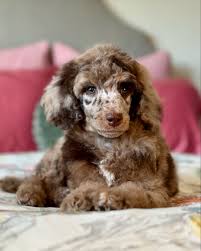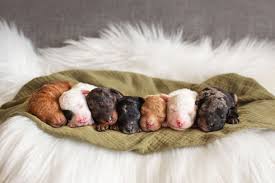INTRODUCTION
Can a Poodle Be Merle They are intelligent, hypoallergenic, and friendly. Traditionally, poodles come only in four solid colors: black, white, apricot, and brown, and their curly coats make them a highly prized status symbol among owners. However, one coat pattern, the Merle pattern, characterized by a marbled or mottled effect, almost like patches of diluted colors, has generated an enormous amount of discussion and curiosity among many dog enthusiasts.

What is the Merle Coat Pattern?
To determine if Poodles can be Merle, it is first necessary to know what a Merle coat pattern is. A Merle is a coat color pattern and not a color by itself. It is a gene manifestation of action often denoted in shorthand as the letter “M”, which causes a dilution of pigment in the coat of the dog.
What is the Merle Poodles
Blue Merle: A grayish-blue base coat overlain by black or grey patches
Red Merle: An reddish-brown base coat, overlain with much-paler-colored Merle patches
Black Merle: Base color is black, and solid all over, overlain by lighter colored Merle patches
Chocolate Merle: This means chocolate or brown base coat, with very much diluted colored patches.
Silver Merle: A silvery or gray base with lighter patches.
Can Poodles Be Merle?
Indeed, Poodles can have a Merle coat pattern, but it’s rare and comes with specific conditions. The Merle gene itself is rare in Poodles. Indeed, this one isn’t a feature included in the breed standard coat color options. Merle Poodles are bred for specific reasons and, most of the time, don’t fit in with the rest of the breed.
Merle pattern is not recognized by the American Kennel Club in Poodles
The Merle pattern is not recognized by the American Kennel Club in Poodles. This means a Poodle carrier of the Merle gene is not permissible in conformation shows because the Merle pattern is not an established Poodle coat color. It does also have a link to specific health issues that we will revisit later.
Types of Merle Poodles

AKC breed standard for Poodles
The AKC breed standard for Poodles defines that acceptable coat colors for Poodles are:
black, white, apricot, cream, brown, silver, red, blue, and gray
Merle is considered on the list of colors prohibited for Poodles, thus any Poodle with the Merle pattern will be disqualified from conformation events. It is not merely because the Merle gene is not prevalent in the breed, but also because of the associations with health problems which may develop when the gene is expressed.
Merle Poodles in the Breeding
Merle Poodle belongs to the designer dog breed, and they are bred mainly outside the traditional standards of Poodle breeding. The Merle pattern genetics don’t match the established Poodle standard. A lot of breeders have resorted to cross-breeding Poodles with other Merle-patterned dogs, such as Australian Shepherds, to come up with a Merle Poodle.
Health Risks Associated with the Merle Gene in Poodles
While the Merle gene itself is not harmful to a dog, health issues can develop if inherited in double dose. When both parents pass along this Merle gene, that puppy becomes a “double Merle” pet. These dogs are more likely to develop serious health problems due to this reason, and for that reason, an ethical breeder would avoid breeding two Merle dogs together.
Deafness and Blindness
Double Merles also suffer from congenital deafness and blindness. This is due to the fact that the Merle gene affects the development of the inner ear and the eyes. The more Merle genes that are inherited, the greater the risk that these problems will occur. Deafness and blindness can occur in one or both of an ear and an eye, and in the worst cases, a dog can be entirely and permanently blind and deaf.
.
Skin and Coat Issues
The lack of pigmentation in some parts of their skin means an increased sensitivity and danger of sunburns and other dermatological issues.
Single Merle Poodles tend to suffer from fewer skin or coat issues. However, they will still likely exhibit some alteration in their coats, such as an aging fade, but they should not have all of the severe skin-related issues that double Merles so often do suffer from.
Other Health Issues
Apart from sensitivity, double Merle dogs can have many other health issues like partial blindness, hearing loss, and genetic mutation. The right parental testing for genetic problems and the right planning of Merle breeding are needed to avoid the production of too many double Merles.
Are Merle Poodles for You
In fact, Merle Poodles might be gorgeously beautiful but should be acquired with proper consideration of the health implications. Single Merle Poodles usually turn out to be fairly healthy
If you want a Merle Poodle, find some responsible breeding that knows about the risks and then understand that both parents are health tested to diminish the odds of genetic defects. Prepare yourself for very special care such as frequent vet visits and restrictions on direct sun exposure


Pingback: Do Merle Poodles Have Blue Eyes ? Info History & Pictures - Merle Poodle